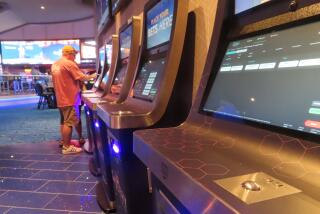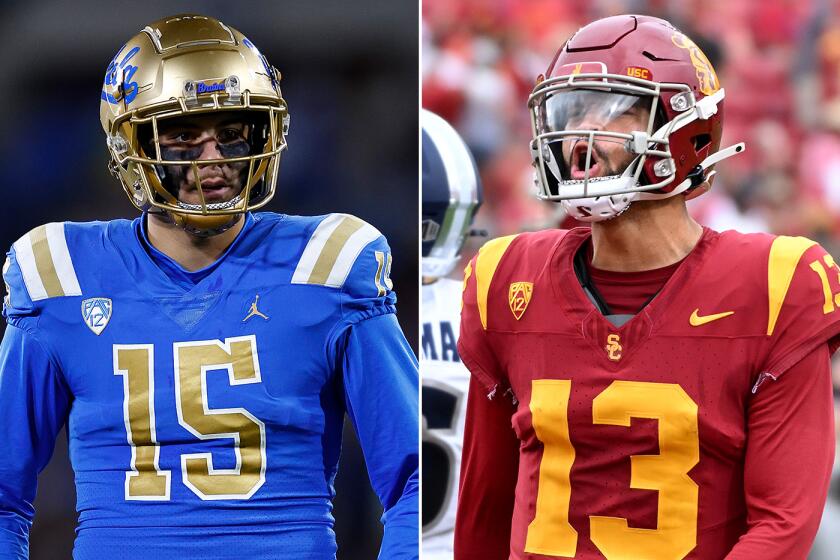It’s a safe bet that Supreme Court decision will be a game-changer for pro sports leagues
Imagine walking into the new football stadium in Inglewood, and, before finding your seat, plunking down $20 on how many carries Todd Gurley will get in that day’s Rams game.
Or stopping at a kiosk at Staples Center to bet on the number of assists by Lonzo Ball, or at a booth inside Angel Stadium to wager on whether Shohei Ohtani winds up with more pitching wins or home runs.
No one knows for sure how Monday’s Supreme Court decision will affect the sports landscape, but it’s a safe bet that it will further enrich professional leagues by driving up interest and changing the way some people consume sports.
The 6-3 ruling struck down a federal law that barred sports gambling, and gives states the choice to be like Nevada and let people wager on the results of games.
“Fans will have skin in the game,” said producer David Hill, who launched Fox Sports. “That’s the reason fantasy leagues have been so successful. That’s kind of like betting lite. The fact that you’ll have skin in the game makes it so much more enjoyable, especially if your call is correct.”
Mark Cuban, owner of the NBA’s Dallas Mavericks, sees an even more seismic shift afoot.
“Everyone who owns a top-four professional sports team just basically saw the value of their team double,” Cuban said on CNBC. “It can finally become fun to go to a baseball game again.”
While the NFL appears to be taking a wait-and-see approach, Major League Baseball and the NBA have advocated for 1% off the top as an “integrity fee” when people wager on their games in the regulated market. In theory, that would pay for the cost of monitoring wagering and keeping the competition pure.
In conversations with legislatures from different states, the leagues also have focused on four other key topics, according to a report in the Sports Business Journal: access to transactional betting data, along with other information they say can be used to detect corruption; the ability to “opt out” of certain games or types of bets that are particularly vulnerable to misconduct; a rule that sports books use only official game stats provided by the leagues and teams; and the availability of mobile wagering so that fans can bet without visiting a casino or racetrack.
Las Vegas casino operators consider these such layers of additional oversight unnecessary, and say that regulations in place in Nevada could be the model for all states.
The NCAA has long sought to distance itself from gambling and it is unclear how college sports will react to the new betting landscape, but in the wake of Monday’s decision, professional leagues called on the federal government to “enact a core regulatory framework” for legalized sports wagering.
“Congress has long recognized the potential harms caused by sports betting to the integrity of sporting contests and the public confidence in these events,” the NFL said.
However, there’s no denying the league already has benefited from the heightened interest associated with gambling, from offshore betting, to countless fantasy football leagues, to weekly fantasy wagers, to informal Super Bowl pools.
The Supreme Court decision figures to remove any remaining stigma associated with sports gambling, and make it more of a mainstream and marketable fixture of game day. Pro leagues may even be able to capitalize financially on the licensing of their marks and logos to gambling establishments.
The NFL would welcome another way to fuel interest, particularly in light of two years of sagging TV numbers, and perhaps further inspire fans to attend games instead of consuming football from the couch.
Amy Trask, a former Oakland Raiders chief executive who is an NFL analyst for CBS, said views of gambling have evolved in the league, especially with more games being played in London — a mecca of sports gambling — and the Raiders relocating to Las Vegas.
“Some owners still view gambling as taboo and are troubled by much of this,” Trask wrote in an email, “many other owners do not consider it taboo and some owners are keen on developing gambling related revenue streams.”
The NHL is the only major professional North American sports league that operates a Las Vegas team. That league reacted cautiously to Monday’s development.
“The Supreme Court’s decision today paves the way to an entirely different landscape, one in which we have not previously operated,” the league said in a statement. “We will review our current practices and policies and decide whether adjustments are needed, and if so, what those adjustments will look like.”
The Vegas Golden Knights became the NHL’s 31st franchise this season. They play at T-Mobile Arena, which was backed by a partnership between Los Angeles-based AEG and MGM Resorts International. A competitive and entertainment success, they have reached the Western Conference final of the Stanley Cup playoffs in their first season.
Bill Daly, deputy commissioner of the NHL, told the Los Angeles Times via email that the league’s next steps “are to be determined.” He also said the league had not seen any “irregularities” in bets involving the Golden Knights. “There has been an increase in betting — almost entirely related/attributable to Golden Knights,” he said.
According to Jay Kornegay, the race and sports director for the Westgate SuperBook in Las Vegas, there has been a 35% increase in hockey wagering at sports books on the Las Vegas Strip this season.
Until the state of California passes such a law regarding sports gambling — and teams, leagues and lobbyists debate what should be included in it — it is too soon to say exactly how that would impact the fan experience.
The Dodgers are one of many sports teams already in partnership with a gambling entity — San Manuel Casino, which also has a plush club inside Staples Center — and it would not be surprising to see teams seek to expand existing deals to include betting windows at the ballpark or arena, USC sports business professor David Carter said.
“In an era where attendance, sponsorship and television revenues have been flat, this could be a financial lifeline,” he said.
For now, as states decide whether to allow sports betting and how to structure it, Major League Baseball has joined other leagues in asking states to share a percentage of the betting revenue. Such an arrangement could enrich the league’s owners, but it also could complicate the league’s already rocky relationship with its players’ union.
Las Vegas casinos have offered betting on baseball for decades, with no cut for MLB teams or players. The gaming industry argues that there is no basis for sharing betting revenue with the league, and that the league will profit handsomely from increased fan interest.
The league argues that the spread of sports betting across the nation could threaten its reputation, and that it could use its share of gaming revenue to ensure betting is on the level. In addition, the league — and its players’ union — each believes it should get a cut of gaming revenue because there would be no baseball to bet on without the league staging games and players participating in them.
“From complex intellectual property questions to the most basic issues of player safety, the realities of widespread sports betting must be addressed urgently and thoughtfully to avoid putting our sport’s integrity at risk as states proceed with legalization,” Tony Clark, executive director of the Major League Baseball Players Assn., said in a statement.
In its statement, MLB said it would work with other leagues in negotiating with state legislators.
“Our most important priority is protecting the integrity of our games,” the MLB statement said. “We will continue to support legislation that creates air-tight coordination and partnerships between the state, the casino operators and the governing bodies in sports toward that goal.”
Joe Maddon, the manager of the Chicago Cubs, said he did not see anything negative about a wide expansion of sports gambling.
“I think it will be controlled properly,” Maddon told reporters in Chicago.
He also did not see why this should be a big deal, since he has seen people bet on sports since his days growing up in Hazleton, Pa.
“As far as I’m concerned, it’s already been legal,” Maddon said. “If it’s been going on as long as it has in Vegas and in every bar — in the back room of many bars, whether it’s been in Chicago or it’s in Hazleton — it’s been part of our culture. It’s out front right now.”
The NBA has a complicated and sometimes unsavory history with gambling. All team employees undergo anti-gambling training, but the league’s new collective bargaining agreement, enacted last summer, includes a provision to include gambling proceeds as part of basketball related income. Such a clause did not exist in the previous agreement between the league and the NBPA, which was effective from 2011 to 2017.
A low point for the league came in 2007 when the FBI investigated former referee Tim Donaghy for betting on games and attempting to control the point spread. Donaghy was investigated as part of a larger organized crime investigation. He pleaded guilty and was sentenced to 15 months in prison.
Following the scandal, the league tried to distance itself from gambling, but that space has closed in recent years.
Casino sponsors have become more common, and this year all 30 teams will be attending Las Vegas Summer League and staying in casino hotels.
About nine months after he became the NBA’s commissioner in 2014, Adam Silver wrote an op-ed in the New York Times supporting the legalization of sports gambling with regulation. His argument centered on the normalization of sports gambling in American culture and the need to be able to regulate the industry, rather than allowing it to continue illegally and unregulated.
Its final sentence read: “But I believe that sports betting should be brought out of the underground and into the sunlight where it can be appropriately monitored and regulated.”
Times staff writers Bill Shaikin, Tania Ganguli and Helene Elliott contributed to this report.
Follow Sam Farmer on Twitter @LATimesfarmer
More to Read
Get our high school sports newsletter
Prep Rally is devoted to the SoCal high school sports experience, bringing you scores, stories and a behind-the-scenes look at what makes prep sports so popular.
You may occasionally receive promotional content from the Los Angeles Times.







